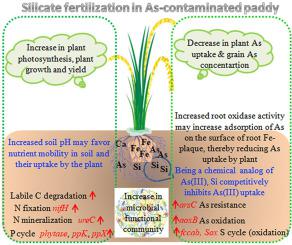Soil Biology and Biochemistry ( IF 9.7 ) Pub Date : 2021-05-22 , DOI: 10.1016/j.soilbio.2021.108307 Suvendu Das , Hyun Young Hwang , Hyeon Ji Song , Song Rae Cho , Joy D. Van Nostrand , Pil Joo Kim

|
Rice grown in arsenic (As)-contaminated soils will have an elevated As concentration in the edible parts and lower yield due to the stressful growing environment. Silicon fertilizer is a soil amendment that can prevent As bioaccumulation and increase rice yield. This may be due to chemical interactions between silicon and As, but we hypothesized that silicon fertilization would improve soil microbial functions that control the bioavailable As concentration and improve the growing environment for rice in As-contaminated agroecosystems. We tested the hypothesis on two geographically different rice varieties (Indica and Japonica) grown on As spiked soils. Rice grown in pots amended with slag-based silicon fertilizer (silicate fertilizer) at a rate of 2 Mg ha−1 had a significantly lower As concentration in the grain, with 28% less As in the grain of Indica rice and 30% less As in the Japonica rice grain. The rice grain yield was 20–22% greater in these rice varieties. There are several reasons that As uptake declined in the rice grain, including: (i) a reduction in As bioavailability, likely because As was absorbed to amorphous and crystalline iron oxides in the soil and on root Fe-plaque, (ii) an increase in As resistant and arsenite-oxidizing bacteria that likely contribute to the natural attenuation of As in soil, and (iii) an increase in the pore-water silicon concentration that competitively inhibited As uptake by plants. Adding silicate fertilizer improved the general soil fertility by increasing the abundance of microbial functional communities involved in nutrient (carbon, nitrogen, and phosphorus) cycling, nitrogen and carbon fixation, methane consumption, and heavy metals/metalloid detoxification, while decreasing the number of microorganisms involved in methane and nitrous oxide production. We conclude that silicate fertilizer amendments stimulate soil microbial functions that are beneficial for rice growth while controlling As bioavailability, and thus are a potential solution to allow rice production in As-contaminated paddy soils.
中文翻译:

土壤微生物对硅酸盐施肥的反应降低了受污染稻田中的生物可利用砷
由于生长环境压力大,在受砷 (As) 污染的土壤中种植的水稻可食用部分的砷浓度会升高,产量会降低。硅肥是一种土壤改良剂,可以防止砷生物蓄积,提高水稻产量。这可能是由于硅和砷之间的化学相互作用,但我们假设硅肥会改善土壤微生物功能,控制生物可利用的砷浓度,并改善受砷污染的农业生态系统中水稻的生长环境。我们对种植在 As 穗状土壤上的两种地理上不同的水稻品种(籼稻和粳稻)测试了这一假设。用矿渣基硅肥(硅酸盐肥料)以 2 Mg ha -1的比例改良盆栽水稻谷粒中的As含量显着降低,of米中的As含量降低了28%,粳米中的As含量降低了30%。这些水稻品种的水稻产量高出 20-22%。稻谷中砷吸收量下降的原因有多种,包括:(i) 砷生物有效性降低,可能是因为砷被土壤中和根部铁斑块上的无定形和结晶氧化铁吸收,(ii) 砷的增加在 As 抗性和亚砷酸盐氧化细菌中,这可能有助于土壤中 As 的自然衰减,以及 (iii) 孔隙水硅浓度的增加,竞争性地抑制了植物对 As 的吸收。添加硅酸盐肥料通过增加与养分(碳、氮、和磷)循环、氮和碳固定、甲烷消耗和重金属/类金属解毒,同时减少参与甲烷和一氧化二氮生产的微生物数量。我们得出结论,硅酸盐肥料改良剂刺激土壤微生物功能,有利于水稻生长,同时控制砷的生物有效性,因此是允许在受砷污染的稻田中生产水稻的潜在解决方案。


























 京公网安备 11010802027423号
京公网安备 11010802027423号